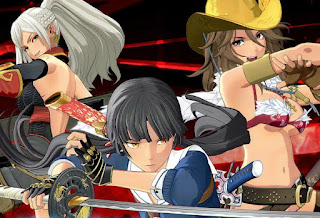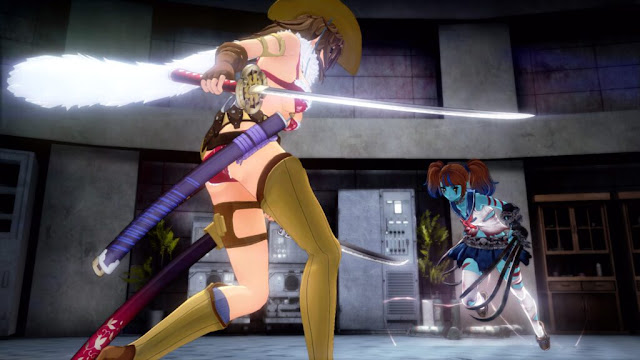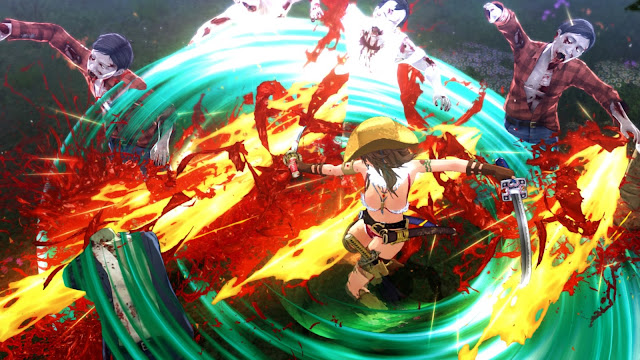I like grindhouse B-grade horror. It’s a genre I grew up deriving a great deal of joy from. I like bikinis. They are a nice aesthetic (seriously, as controversial as this has become to say, women in swimwear are pleasant to look at). I like anime. Anime is a direct hit of Japanese culture, from humour to drama, and everything in the middle. Onee Chanbara Origin, being a grindhouse anime game with plenty of bikinis, is, therefore, my kind of game. And I’m very glad to report that it delivers an authentic experience in almost every way that a person like me might be looking for from it.
“In the contemporary imaginary, “grindhouse” is most frequently associated with the late 1960s and 1970s and the theaters of Times Square, as former first-run Hollywood theaters in major urban centers began to target an audience much changed in the wake of white flight to the suburbs and the first suburban mall multiplexes. Before the advent of home video, these theaters were one of the few venues for films that exploited or subverted social taboos surrounding sex, violence, and race.”
As productions, grindhouse films were characterised by their low budgets, their reliance on sex and violence to excite the crowd, and their simple themes. In fact, to just digress for a moment, these days, you’d have to say that Hollywood blockbusters have been more inspired by grindhouse than anything else. It’s just that they hide behind production values and the veneer of respectability. Add blood to every death and an exposed midriff or breast or two, and The Avengers becomes a grindhouse film in every way.
Of course, grindhouse cinema wasn’t respectable then, and while the film enthusiasts and auteurs like Tarantino have maintained a love for the aesthetic and honesty of actual grindhouse, and even managed to convince some others that the genre does feature inherent artistic merit, it’s still not exactly a commercial quantity today. Onee Chanbara Origin, a game that embraces everything about the grindhouse and is generally pure in being a homage to that era of films, isn’t going to sell bucketloads or be a critical darling. Unlike in America, there remains a small but committed audience for the grindhouse productions in Japan, and that’s why the series has endured on as it has, but everything that the modern western audience likes to see – big budgets and expensive production values – mean that this game would have been relegated to the periphery, even if it wasn’t indulgent about the sex and fetishisation (itself a sore point for American audiences in particular). We should be thankful that we got this game localised at all.
But putting aside those that will judge the game as though it were ever meant to be a blockbuster, what Onee Chanbara Origin does deliver is razor-honed on the specific type of experience that it wanted to deliver, and that’s laudable. Yes, is visually simple, but it’s spot-on for what the developer wanted to achieve. For the first time in the series history, the artists have used cel-shaded visuals, and that was the right move to make. Unburdened by the need to try to deliver a sense of “realism” with the character models as with previous games in the series (something that they struggled to do, given the limited budgets at play), Origin is instead free to be a blissfully, brightly gory adventure, with cut scenes designed to show off every inch of each major character’s brightly cartoonish body. What’s important is that it’s very pleasant to look at, and comes across as much aesthetically comfortable than its predecessors, in which character models were constantly sinking into the uncanny valley of looking realistic, but not realistic enough. Here, Origin comes across as simply playful, and it’s charming for what it’s offering.
This is not to say it’s the perfect game. Environments are incredibly uninspired, and locations that don’t really fit with the exploitation and grindhouse theme. A trip through a hospital in one scene is marginally appropriate, though it’s not interesting enough as a hospital to grab attention. Wandering around a sewer just doesn’t work at all as a location, however. Setting and place is surprisingly important to the grindhouse aesthetic, because the filmmakers lacked the budgets to indulge fantastic locations. As a result, they generally went the other way to use natural environments in a very natural manner. The bland hallways and arenas of Onee Chanbara Origin lack the same aesthetic and energy that the characters and general setting of other grindhouse games (including developer and franchise stable-mate, School Girl/Zombie Hunter), and don’t do the game any favours.
I would not be surprised if Onee Chanbara Origin will be the last game in the series because of this. Grindhouse is no longer acceptable in videogames without compromise, where previously it was critised, but allowed to find an audience. Moving forward it’s a safe bet that there will be an increasingly strident “no tolerance” policy on these things. To quote Esch again as he discusses the box office failure of Tarantino and Rodriguez’s Grindhouse film double feature: “Though undeniably a product of late capitalist Hollywood, Grindhouse was also an ambivalent experiment in cinema exhibition, an attempt to simulate a theatrical experience outside of the strict temporal regimes and behavioral guidelines of the modern multiplex.” Onee Chanbara is, in its own way, a reflection on the changing values of video games. A shift to cel-shading was both the right move aesthetically, but also acts to make the sexiness less “real” and a tempering of the edges to appease the platform licensing decision-makers. It was clearly an attempt to find a middle ground: to “simulate a side of video games that now exists outside the strict behavioural guidelines of modern video games,” while at the same time not being actively banned from those platforms.
Tempered at the edges as it might be, Onee Chanbara Origin is still crass and skimpy, and an explicit work of nostalgic grindhouse for anyone that remembers that genre. Additionally, short as it may be, it’s genuinely well-made for what it wants to be: a mindless action game. It’s just that the tempering at the edges means that it’s not as pure as something like School Girl/Zombie Hunter, and therefore won’t replace it as the best trash grindhouse this generation has given us. What it is, though is more than enough to remind us that we may well get very little of that in the next generation, and to make no bones about it, that’s very disappointing to me.
– Matt S.
Editor-in-Chief
Find me on Twitter: @mattsainsb
The critic purchased a copy of this game for review.










